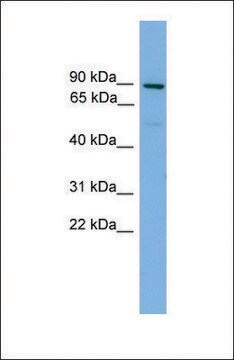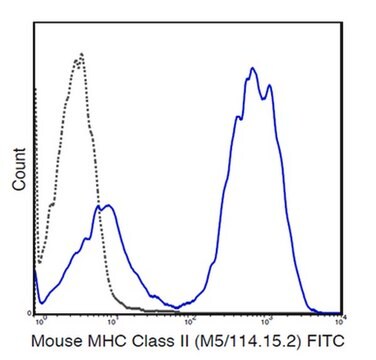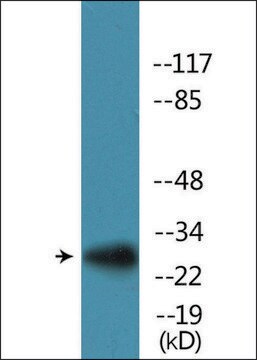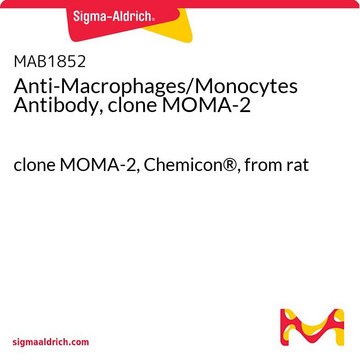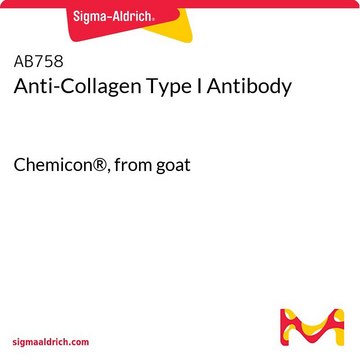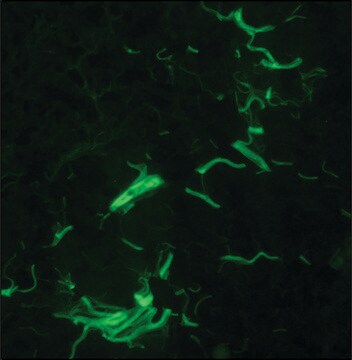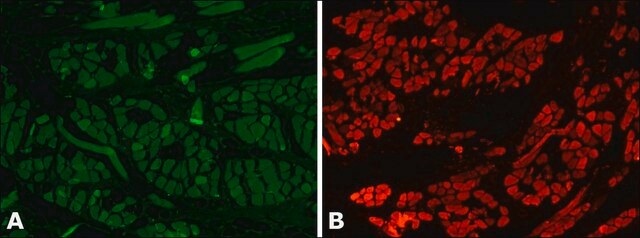SAB4700663
Monoclonal Anti-MHC Class II-FITC antibody produced in rat
clone M5/114, purified immunoglobulin, buffered aqueous solution
Sinonimo/i:
Rat Monoclonal Anti-MHC Class II-Fluorescein isothiocyanate
Autenticatiper visualizzare i prezzi riservati alla tua organizzazione & contrattuali
About This Item
Codice UNSPSC:
12352203
NACRES:
NA.41
Prodotti consigliati
Origine biologica
rat
Livello qualitativo
Coniugato
FITC conjugate
Forma dell’anticorpo
purified immunoglobulin
Tipo di anticorpo
primary antibodies
Clone
M5/114, monoclonal
Stato
buffered aqueous solution
Reattività contro le specie
mouse
Concentrazione
0.5 mg/mL
tecniche
flow cytometry: suitable
Isotipo
IgG2b
Condizioni di spedizione
wet ice
Temperatura di conservazione
2-8°C
modifica post-traduzionali bersaglio
unmodified
Descrizione generale
Major histocompatibility complex II (MHCII) is specifically localized on antigen presenting cells, such as macrophages, dendritic cells and B cells. MHC class II are classified in to two types classical and non- classical MHC class II molecules. In humans, there are three classical class II molecules HLA-DP, -DQ and –DR and two non-classical molecules, namely HLA-DM and –DO.
The rat monoclonal antibody M5/114 reacts with murine MHC class II glycoproteins. It recognizes a shared determinant on I-Ab, I-Ad, I-Aq, and I-Ed, I-Ek alloantigens, but it does not react with I-Af, I-Ak, I-As. This antibody can inhibit I-A-restricted T cell responses of the H-2b, H-2d, H-2q, H-2u but not H-2f, H-2k, H-2s haplotypes.
Immunogeno
Activated C57BL/6 mouse spleen cells
Applicazioni
The reagent is designed for Flow Cytometry analysis. Suggested working dilution is 4 μg/mL of sample. Indicated dilution is recommended starting point for use of this product. Working concentrations should be determined by the investigator.
Azioni biochim/fisiol
Major histocompatibility complex II (MHCII) plays a vital role in initiating immune response by presenting peptides derived from extracellular pathogens to T cells bearing the CD4 marker. Mutations in the gene increase the risk of susceptibility to autoimmune diseases such as diabetes mellitus, rheumatoid arthritis and pemphigus vulgaris.
Caratteristiche e vantaggi
Evaluate our antibodies with complete peace of mind. If the antibody does not perform in your application, we will issue a full credit or replacement antibody. Learn more.
Stato fisico
Solution in phosphate buffered saline, pH 7.4, with 15 mM sodium azide.
Esclusione di responsabilità
Unless otherwise stated in our catalog or other company documentation accompanying the product(s), our products are intended for research use only and are not to be used for any other purpose, which includes but is not limited to, unauthorized commercial uses, in vitro diagnostic uses, ex vivo or in vivo therapeutic uses or any type of consumption or application to humans or animals.
Non trovi il prodotto giusto?
Prova il nostro Motore di ricerca dei prodotti.
Codice della classe di stoccaggio
10 - Combustible liquids
Punto d’infiammabilità (°F)
Not applicable
Punto d’infiammabilità (°C)
Not applicable
Scegli una delle versioni più recenti:
Possiedi già questo prodotto?
I documenti relativi ai prodotti acquistati recentemente sono disponibili nell’Archivio dei documenti.
Li Dong et al.
Journal of inflammation research, 14, 2471-2482 (2021-06-19)
Parkinson's disease is a common neurodegenerative disease in the elderly. The incidence of various cancers in Parkinson's disease patients is significantly lower than in healthy people. Parkinson's disease patients are individuals with a high tendency for inflammation, whose peripheral immune
REGULATION OF MHC CLASS II GENES: Lessons from a Disease
Mach B, et al.
Annual Review of Immunology, 1996, 301-331 (1996)
Genetic Control of MHC Class II Expression
Ting JP and Trowsdale J
Cell, 109, S21-S33 (2002)
A molecular basis for MHC class II--associated autoimmunity
Todd JA, et al.
Science, 240, 1003-1009 (1988)
Yoshihiro Kuwano et al.
International immunology, 19(8), 977-992 (2007-09-07)
CD83 is a member of the Ig superfamily expressed primarily by mature dendritic cells (DCs). In mice, CD83 expression by thymic stromal cells regulates CD4(+) T cell development, with CD83(-/-) mice demonstrating dramatic reductions in both thymus and peripheral CD4(+)
Il team dei nostri ricercatori vanta grande esperienza in tutte le aree della ricerca quali Life Science, scienza dei materiali, sintesi chimica, cromatografia, discipline analitiche, ecc..
Contatta l'Assistenza Tecnica.
